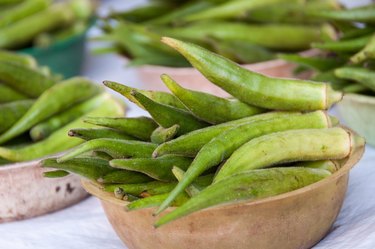
Irritable bowel syndrome, or IBS, is a digestive disorder that affects about 20 percent of adults in the United States, according to the National Institute of Diabetes and Digestive and Kidney Disorders. While IBS causes a lot of discomfort, including gas, bloating, diarrhea and constipation, it does not cause any permanent harm to your intestinal tract, and can be managed with medication, lifestyle changes and diet. Your diet for IBS depends on your symptoms, and foods like okra may help your symptoms or make them worse.
GI upset can be caused by an okra allergy, or your underlying bowel disorder. Here's some more info on how to tell the difference.
Video of the Day
Video of the Day
Okra
Okra, which is also called gumbo, is an annual vegetable in the same family as the hibiscus. Okra is a versatile vegetable often added to soups and stews, or eaten fried or boiled. Nutritionally, you can't go wrong with okra. It is low in calories, and a good source of fiber, vitamin A, vitamin C, folic acid and calcium. A 1/2-cup serving of cooked okra contains 25 calories, 2 g of fiber, 1.5 g of protein and 6 g of carbohydrates.
Diet for IBS
Diet plays an important role in helping you manage your IBS. But foods that cause problems can can vary from person to person. It is recommended that you keep a food diary and note your symptoms, then discuss them with your doctor or a dietitian to help you determine trigger foods and develop a diet plan. Most people with IBS find that increasing fiber in their diet can help alleviate constipation, while others find that the fiber exacerbates their diarrhea.
IBS and Constipation
If IBS causes constipation, it is recommended that you follow a diet high in fiber. Fiber in food adds bulk and softens stool, which prevents the formation of hard stools that are difficult to pass. In addition, eating a high-fiber diet keeps the colon distended, which may help prevent spasms. You should aim for 20 to 35 g of fiber a day. As a good source of fiber, okra makes a good choice to help alleviate your constipation associated with your IBS. Other high-fiber foods include whole grains, fresh fruits, other vegetables and beans.
IBS and Diarrhea
When experiencing a flare-up of diarrhea, it is recommended that you limit the fiber in your diet and follow a low-residue diet to help alleviate your symptoms. In this case, okra may not be a safe choice, and you should limit or avoid it. If you do include okra in your diet, it should be boiled until very soft. In addition, you should also avoid other raw fruits and vegetables, and whole grains during a flare-up. Dairy products may also exacerbate your diarrhea, and should be avoided. Try to eat small meals, and drink plenty of fluids to keep yourself hydrated.
Is this an emergency? If you are experiencing serious medical symptoms, please see the National Library of Medicine’s list of signs you need emergency medical attention or call 911.